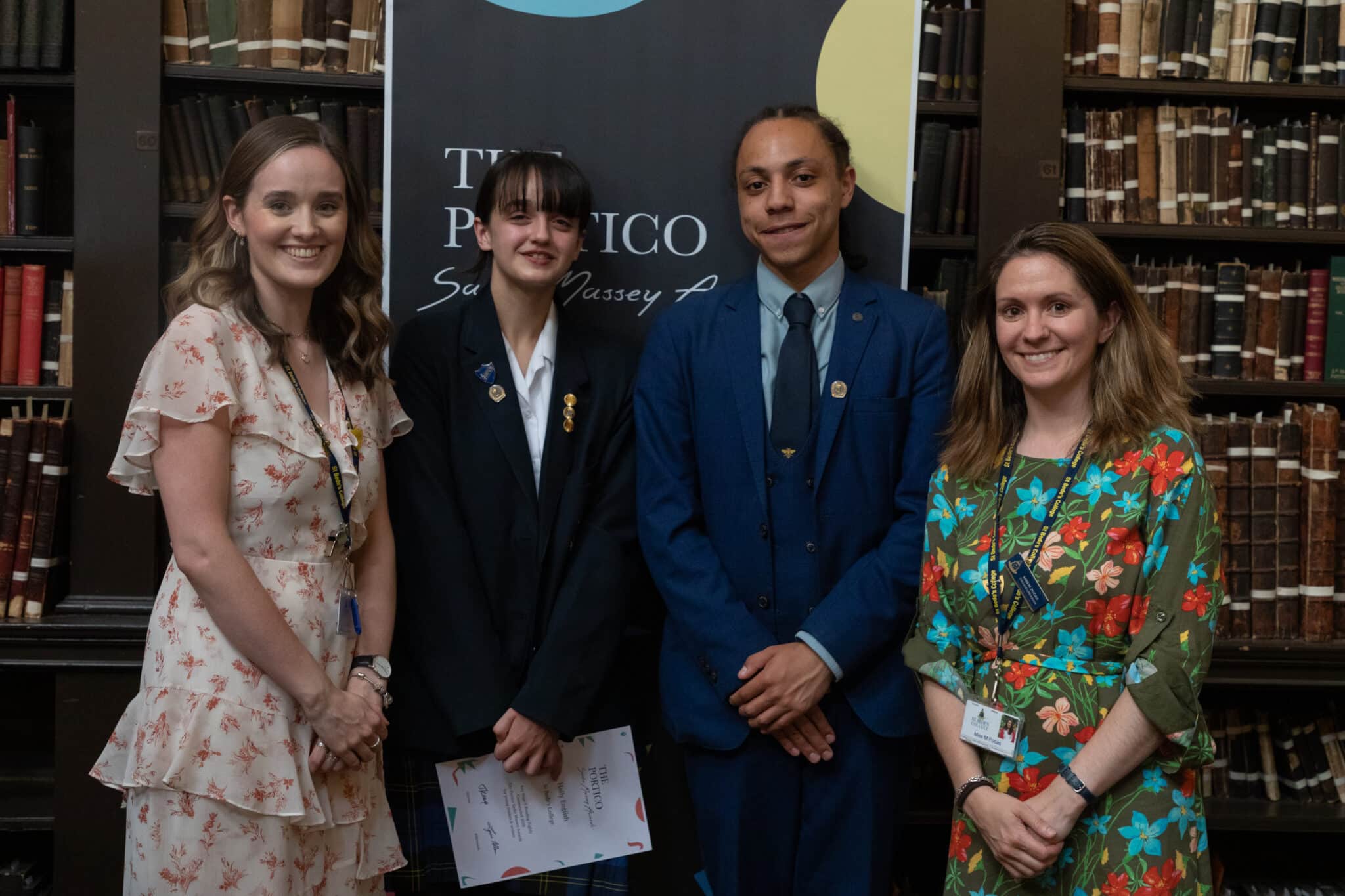A huge congratulations goes to Holly E (U4) and Aaron A (L6) for both being awarded ‘Highly Commended’ for their creative writing and reading submissions to this year’s Sadie Massey Awards.
Established in 2015, the Portico Sadie Massey Awards aims to encourage a life-long love of reading and writing in young people from all backgrounds. The Portico Library itself was established in 1806 and Many members wrote influential books, such as our first Secretary Peter Mark Roget, who wrote the first English thesaurus, and founder of atomic theory, John Dalton. Celebrated Manchester author Elizabeth Gaskell also used the Library while her husband William acted as its longest-serving Chair. The Awards are named after Glasgow-born Sadie Massey and her desire to spread a love of reading and writing. While living in Manchester, Sadie and her husband Alex began helping disadvantaged children through various charities. This desire to give opportunities to all young people is continued through the Portico Sadie Massey Awards.
The awards cover both reading and writing – students had the opportunity to enter book reviews as well as pieces of original writing that focused on the setting of the North of England. Holly’s review of ‘Circe by Madeline Miller’ and Aaron’s short story titled ‘Journey to School’ were shortlisted by the judging panel and on Thursday 15th June they received their certificates at an exclusive awards event hosted at the Portico Library. The awards ceremony featured readings from the children’s author Livi Michael, as well as poet Dom Conlon.
As a previous winner myself of the Sadie Massey Award, it was wonderful to see our own students take part and be celebrated for their achievements, as well as continue the legacy of Sadie Massey. Another massive congratulations to the two for this fantastic achievement, as well as to all of our other pupils who entered the competition this year – they have shown true Bedian spirit and all produced some fantastic pieces of writing!
Read here the winning pieces: ‘Circe by Madeline Miller’ review by Holly E (U4) and ‘Journey To School’ written by Aaron A (L6)
Miss M Moore, English Teacher and Head of House for Siena
Aaron A – Journey To School
In a big city, it can be very easy to get lost. To reach the point in which you feel completely unimportant in a sea of intellectuals and bohemians. But also in the way in which you get on the wrong bus. End up in the middle of nowhere; miles away from your desired destination. Without the slightest inclination of how you got there, or how on earth you are going to get home.
This was my predicament when I first had to navigate Manchester alone. An eleven-year-old with a backpack of bricks, double his size, on the precipice of high school, I was crushed by the burden of my first solo journey. As I hoveled through the mega bus I felt as if I had joined the eclectic mix of nobodies. All with the same destination, but the hope of going home, sharing in that sultry coffee-scented air on a bitter-sweet September morning. I was finally a commuter, and I was already sick of it!
I will be the first to admit that I have never been the most patient of people, so I was greatly dismayed to find that after twenty minutes I was barely a mile away from my bus stop. Dishevelled men and women seemed to hovel onto the bus at near enough every stop meaning that I was forced to spend what felt like an eternity in Chorlton-cum-Hardy.
I had always found this leafy green suburb to be quite garish. The worst type of middle class. A mix of middle-aged pseudo-intellectuals who would whine when the cheesemonger’s Wigmore was too nutty, and coddled millennials who would openly protest if the local plant-based grocery store, Unicorn, dared to stock something that was not organic.
It is fair to say that at the ripe old age of eleven, I was a cynic. I was a character straight out of a Salinger novel, quick to point out all the faults in the world and call out everybody’s phoney behaviour without noticing my own flaws. So in some respects, I am deeply grateful for those bus journeys. They helped me notice the nuances in the places where I was quick to criticise. But of course, it would be cretinous to say that that one bus journey irrevocably changed my life. Those twenty minutes stuck in traffic did not help me come to a life-altering realisation that I was too critical and that in order to survive the next five years I had to become less judgemental. The realisation was somewhat gradual. But if I were to pinpoint where it began I would have to say it was the first time I saw Edith.
That strangely torrid autumn morning was the first time I lay eyes upon her. I called her Edith for the next five years because of her resemblance to Edith Sitwel, but I never knew her real name. She never got on my bus, but every morning she would sit at her Chorlton stop staring into a small vanity mirror. She looked roughly about eighty years old and was the most fabulous woman I had ever seen. She took fastidious care in her appearance. Every morning, taking the greatest precession apply her lip liner and with the attentiveness of a surgeon, she would attach each false eyelash. Her outfits were lurid in the best way possible; always adorned with outrageous feathers or the most ostentatious jewels imaginable. She was ‘naive camp’ in the truest sense of the term. She was unapologetically feminine and impenitently different.
She was the physical embodiment of a Chorltonite.
Chorlton has always been a place for nomads. Men and women who never fit the curb. Sure over the last few years, the area had become somewhat gentrified but at its core, it will always be home to those who were somewhat different. Whether that be Irish immigrants in the 1880’s seeking refuge in the chapel where the bowling green now stands, or twenty-two-year-olds in the 2020s who spend mornings in Beech road park reading Kierkegaard and sipping on their bubble tea. Chorlton is and always will be somewhere special, and that morning, seeing her for the first time, was my first glimpse into that.
From that moment on the bus journey slowly began to become somewhat tolerable. Partially because of the curious feeling Edith had kindled. Partially because the bus had begun to move at a decent pace. From then on I could put on my headphones and listen to some New Order whilst the bus brought me to Rusholme.
I spent the next thirty minutes in a state of complete bliss. The music had brought me so much serenity that all the anxieties I had about my destination had drifted away, to the point in which I had almost forgotten where I was going. It was not until I noticed a sign indicating that I was part way through Moss Side that it dawned on me that I should have changed buses a mile back.
With great apprehension, I pressed the small red stop button and slowly sauntered to the front of the bus. I felt as if I were about to walk into the deepest deeps of perdition. I did not know why I was being punished but I had to prepare myself for the worst. I somewhat expected to see rotting carcasses on street corners and gang members casually walking with guns. According to my phone, all I had to do was walk five minutes up Claremont Road, but in the heart of ‘Gunchester’ that sounded practically like a suicide mission.
In hindsight, it’s funny to see how an eleven-year-old brain could construct such a dramatically inaccurate picture of depravity from a few newspaper clippings, older than his parents. Yet stepping off that bus I felt simultaneously bilious and fearless like Charles Marlow. I was ready to step deep into a heart of darkness, prepared to see the worst humanity was capable of.
I began my perilous journey down the long-stretching Claremont Road but was suddenly consumed by a feeling of shame. An area which I convinced myself was iniquitous to its core was anything but. It possessed an irrefutable feeling of fraternity.
At eight-thirty on a Tuesday morning on the cusp of autumn families were already out. Trying to cling to those fading moments of Summer. Reggae music was blasting from speakers, children drinking ice drinks running up and down the side of the street; as parents reading looked out at their children from the enclaves of Victorian townhouses, amidst the budding greenery of Alexander park.
Moss Side was once a place where Edwardians flocked to escape the industrial centre. Eventually villainised it was stuck in a cycle of extreme poverty for decades. Now a community finding joy in a September morning attempts to shake off its name’s heinous connotations.
I waited at the bus stop in this area which Gaskell once described as a ‘rural idyll’ basking in the joy of these residents before my bus arrived. More stable than before, I sat in complete silence, peering through a window, as the time and distance elapsed bringing me closer to school.
Soon the bus was halfway down Rusholme’s famous curry mile, as shops opened their shutters for the new day. The smell of the most amazing spices began to seep through the small open window of the bus allowing the aromas to transport me to South Asia. I sat there in the most blissful of states as the finest Sarees lined the streets taking me closer to my new home.
Stepping off that bus a few moments later proved to be almost a whirlwind. My adventure had just ended but a bigger one had begun. I took solace in the knowledge that I had explored the streets that revolutionaries once called home and survived to tell the tale. From Marx and Pankhurst to Turning. We all share a bit of madness in this city, which so easily pushes us to our limits and challenges our every idea.
So as I took my first steps through the lofty gates I was ready to be challenged, and to meet my group of intellectuals and bohemians. For I was beginning a journey of discovery. It may seem conspicuous to some but I was starting to learn that judging people and places based on what I assume to be true can be quite dangerous.
Looking back at moments like this I am reminded of the words once penned by a famous honorary Mancunian, “How easy it is to judge rightly after one sees what evil comes from judging wrongly.”
Now that five years have passed, these words will always be etched in my mind as will those journeys. High school did prove to be a great adventure. But no teacher, no classroom, no book could have ever taught me more about humanity and the danger of prejudging others, than those fateful commutes.
Holly E – Circe by Madeline Miller
I chose to read this book because I am very interested in Classics and was looking for an engaging, descriptive fiction book to read. This one was perfect as it interpreted commonly retold stories in an interesting and mythologically accurate way!
I think this book is aimed at fourteen- year- olds to adults of any age; the incredible messages of empowerment, one- of- a- kind retellings of ancient stories, insightful character journeys, beautifully poetic descriptions and interesting interpretations of character’s actions make this book perfect for a wide range of people.
This novel revolves around a nymph named Circe who appeared in Homer’s Odyssey. She is the daughter of the Sun God Helios but despite her parentage is looked down on and ignored amongst immortals. Through making a terrible mistake, she discovers that she is a witch, before being cast out of her home and exiled to the beautiful yet lonely island of Aiaia with no neighbours to speak with but lions and wolves. She starts to hone her skills and occasionally travel. Circe then begins to retell many famous myths from the heroic age of Greece drawn from her own experiences. She meets Daedalus and Icarus, the Minotaur, Ariadne, Jason, Medea, Odysseus and many more famous heroes and monsters in her time, watching them rise to glory before fading into dust and legend.
The book truly made me consider these glorious yet lonely implications of immortality and how desperate a world with fallible gods would be. Circe’s whole life is shaped by powerful Gods such as Zeus- who she never meets in the story (an interesting choice from the author). The ending is a hopeful one that does not dismiss Circe’s struggles, serving as a natural conclusion for the Goddess’ journey (in summary, a seemingly endless fight against the wrathful pantheon above her). It is an incredible last act of defiance from Circe completely befitting of her character!
I also enjoyed the book because it constantly subverted the tropes seen in ancient epics- Circe is rarely treated by others as someone of great importance or even a hero yet manages to live a fulfilling life whilst overcoming fate in her own way.
I would completely recommend this book to anyone that is interested in Greek Mythology. The story takes a relatively minor and mostly unknown goddess and elevates her character as she becomes a mighty and unmovable immortal in a world that is certainly not on her side. This book’s messages are almost comforting; despite the fact that Circe is not the most powerful person in her world, she learns to take control of her life and show others not to cross her. She is put through a great amount of suffering because she is a woman, which is information that many retellings of ancient literature do not acknowledge. It is important to recognize this as many mythological women like Circe are often viewed as heartless or hateful despite them only taking revenge on their abusers.
I have given this book five out of five stars as it sheds light on the life of an overlooked and underappreciated Nymph born into an uncaring and spiteful world. It retells ancient tales from a new perspective and adds a unique, immense depth to their characters. It is most certainly worth a read!




